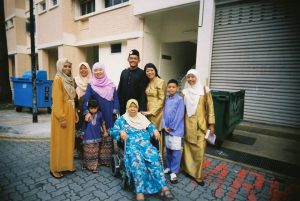Malay Muslim Worldviews and Social Work Practice in Singapore
August 4, 2020

Hari Raya Haji, also known as the Festival of Sacrifice, falls 70 days after the holy month of Ramadan, and marks the end of the annual holy pilgrimage to Mecca, demonstrating each practicing Muslim’s submission to Allah. The festival typically lasts for up to four days.
In lieu of the festival, the article “Malay Muslim Worldviews: Some Thoughts for Social Work Practice in Singapore” (Journal of Religion and Spirituality in Social Work: Social Thought, 2014), by Dr Rosaleen Ow (NUS Department of Social Work) and Nur Hilayah Bte Separin (Ang Mo Kio Family Service Centre), highlights that being Malay in Singapore is more or less synonymous to being a Muslim. The research thus delves into the Islamic practices that are closely tied to the Malay way of life. More crucially, they state that there has been a dearth of literature on social work practice on the Malay Muslim community in Singapore; as such, their article seeks to illustrate how the Malay Muslim worldview has strong implications for social work practice in health and family related issues in Singapore.
The article closely examines the Malay Muslim worldview on life and death, health and illness, and family life in the context of social work practice in Singapore. In the example raised on health, Dr Ow and Hilayah note that the experience of illnesses and disease in the Malay-Muslim community is closely related to the need to seek spiritual and religious support. As such, this leads to a stronger preference for home care rather than institutional care, as the environment of the latter may not be as conducive for ensuring that the religious and spiritual aspects of care are adequately fulfilled.
The article stresses ultimately, that health care professionals should understand the specific religious and spiritual needs of a Malay Muslim and the patient in order to provide holistic care. As Dr Ow and Hilayah urge, cultural competency is necessary for social work practice. Beyond knowledge acquisition and skills training, they also encourage social workers to invite their clients to share the cultural, religious, and spiritual believes that may be influencing their current life situation.
Read the full article here.
